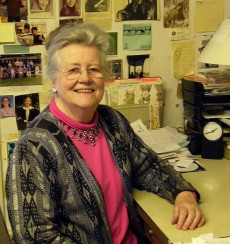‘Unpacking the Invisible’: Peggy McIntosh Speaks on Impact of White Privilege
Campus Life
Published November 10, 2014
Marisol Fernàndez Y Mora ’17 says she welcomed the conversations about race that took place on campus during last week’s Otelia Cromwell Day celebrations.
Yet there is always the concern that “these things fizzle out,” said Fernàndez Y Mora, who is a member of the ad hoc Concerned Students of Color Committee.
In an effort to keep those discussions going, committee members have invited a national anti-racism expert to visit campus this week.
Distinguished scholar and teacher Peggy McIntosh, senior research scientist and associate director of the Wellesley Center for Women, will speak at 7 p.m. on Wednesday, Nov. 12, in Weinstein Auditorium.
McIntosh’s talk, “White Privilege: Unpacking the Invisible Knapsack,” will focus on the role privilege plays in sustaining racism and other forms of prejudice.
The co-founder of the National SEED (Seeking Educational Equity & Diversity) Project on an Inclusive Curriculum, McIntosh will also outline strategies for achieving more equitable schools, workplaces and communities.
Her talk is sponsored by the president’s office, the dean of the college and dean of students offices, and the departments of multicultural affairs and religious and spiritual life.
Fernàndez Y Mora said students were eager for a forum that would “emphasize the experience of students of color and also be a call to allyship among other students.”
McIntosh’s scholarly work makes her “an incredible ally” in encouraging discussions about privilege, Fernàndez Y Mora said.
McIntosh’s 1988 paper, “White Privilege and Male Privilege,” is considered a classic of feminist and anti-racism work. In it, she cites 46 examples of white privilege, including “I am never asked to speak for all of the people in my racial group.”
Dean of the College Donna Lisker pointed out that understanding white privilege is important for tackling other invisible systems of advantage.
“This is a timely conversation—and not only about race,” Lisker said. “It also relates to discussions going on in our country about the ‘one percent’ and sexual violence. It’s a really helpful way to discuss power.”
While McIntosh’s work focuses on difficult issues, she presents ideas in a way that encourages dialogue, Lisker said.
“What I like about her is she’s so accessible,” Lisker said. “When people hear the word ‘privilege’ they can often go back on their heels and get defensive. But Peggy McIntosh helps people understand that privilege is invisible. And it’s important to understand in whose interest it exists.”
In a May 2014 article in The New Yorker magazine, McIntosh noted that colleges are places where conversations about racism and white privilege can happen because “they are the places where you get a hearing.”
“In order to understand the way privilege works, you have to be able to see patterns and systems in social life,” McIntosh said in the article. “But you also have to care about individual experiences.”

McIntosh, who has taught English, American studies and women’s studies at Wellesley and Harvard, has led forums on race relations for organizations ranging from public schools to the Episcopal Church to the NASA Space Center.
Fernàndez Y Mora said McIntosh’s talk at Smith is “a call to my fellow students who want to become allies” in addressing racism and other forms of discrimination.
“These conversations are necessary,” Fernàndez Y Mora said. “As a prestigious women’s college, Smith holds a lot of privilege. We want to talk about how we can use that privilege to change things for the better.”
The Concerned Students of Color Committee is hosting a forum for self-identified students of color on Friday, Nov. 21, at 4 p.m. in Helen Hills Hills Chapel.